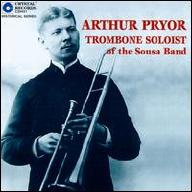Pryor was born in St. Joseph, MO, either on September 22, 1870 (the date most often given), or in April 1869; because he was listed as being nine months old when the United States Census was taken in early 1870 (according to music historian David Sager), April 1869 might be accurate. Pryor came from a very musical family; his father, Samuel Dallas Pryor (b. 1844, d. 1902), was the leader of Pryor's Military Band, which was also known as the 4th Regiment Band of Missouri and was popular in and around St. Joseph in the 1870s and 1880s. Pryor's older brother Walter D. Pryor (b. 1867, d. 1937) became a cornetist, and his younger brother Samuel Pryor, Jr. (b. 1881, d. 1943) played drums. By the time Arthur Pryor was 11, he was being featured as a trombonist in his father's band; as an adolescent, he became a local celebrity in St. Joseph. In 1889, Pryor joined the band of cornetist Allesandro Liberatti (b. 1847, d. 1927), and in 1892, his visibility continued to grow when he joined John Philip Sousa's well-known band as a featured trombone soloist. Sousa's band included some of Pryor's compositions in its 1890s repertoire, including ragtime material.
It was during the 1890s that Pryor was first recorded; one Victorian-era gem that has survived is Pryor's trombone solo on the sentimental 1897 recording There'll Come a Time, released by the Berliner Gramophone Company. In 1895, Sousa promoted Pryor to assistant conductor, but in 1903, Pryor left Sousa's employ and formed his own band -- which was recorded extensively in the 1900s and '10s and was a popular live attraction in Asbury Park, NJ, and elsewhere. In the '20s and early '30s, Pryor did most of his conducting for radio. Pryor had been semi-retired from music when, in 1942, he agreed to conduct a summer concert series in Asbury Park. But Pryor, who had reached his early seventies, suffered a major stroke on June 16, 1942, and died in the hospital two days later on June 18, 1942. Regrettably, only a few collections of Pryor's recordings have been released in the U.S. during the CD era. One of them is Echoes from Asbury Park, an excellent 74-minute CD that Archeophone Records assembled in 2006; spanning 1903-1913, Echoes from Asbury Park boasts skillful digital remastering and comprehensive, informative liner notes by David Sager. ~ Alex Henderson, Rovi













